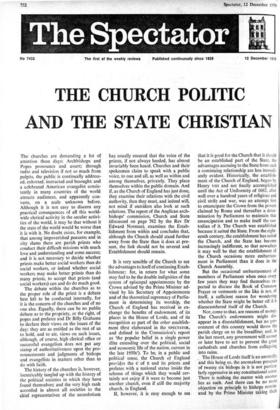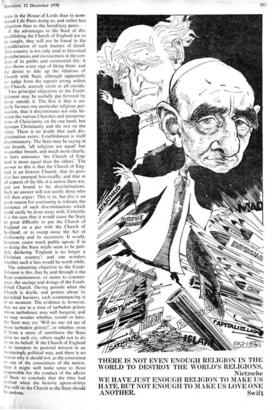THE CHURCH POLITIC AND THE STATE CHRISTIAN
The churches are demanding a lot of attention these days: Archbishops and Popes pronounce and assert; through radio and television if not so much from pulpits, the public is continually address- ed, exhorted, instructed and besought; and a celebrated American evangelist consis- tently in many countries of the world attracts audiences, and apparently con- verts, on a scale unknown before. Although it is not easy to discern any practical consequences of all this world- wide clerical activity in the secular activi- ties of the world, it may be that without it the state of the world would be worse than it is with it. No doubt exists, for example, that among impoverished peasants and in city slums there are parish priests who conduct their difficult missions with much love and ,tmderstanding and some success; and it is not necessary to decide whether priests make better social workers than do social workers, or indeed whether social workers may make better priests than do many priests, to accept that priests (and social workers) can and do do much good. The debate within the churches as to the proper role of the priest is a debate best left to be conducted internally, for it is the concern of the churches and of no one else. Equally, there can be no public debate as to the propriety, or the right, of popes and prelates and Dr Billy Grahams to declare their views on the issues of the day: they are as entitled as the rest of us to hold, and to air, views on such issues, although, of course, high clerical office or successful evangelism does not put any stamp of authoritativeness upon the pro- nouncements and judgments of bishops and evangelists in matters other than to do with faith.
The history of the churches is, however, inextricably tangled up with the history of the political societies in which they have found themselves; and the very high rank accorded in almost all societies to the chief representatives of the sacerdotium has usually ensured that the voice of the priests, if not always heeded, has almost invariably been heard. Churches and their spokesmen claim to speak with a public voice, to one and all, as well as within and among themselves, privately. They place themselves within the public domain. And if, as the Church of England has just done, they examine their relations with the civil authority, then they must, and indeed will, not mind if outsiders also look at such relations. The report of the Anglican arch- bishops' commission, Church and State (discussed on page 762 by the Rev Dr Edward Norman), examines the Estab- lishment from within and concludes that, although the Church should stand further away from the State than it does at pre- sent, the link should not be severed and Establishment should remain.
It is very sensible of the Church to see the advantages to itself of continuing Estab- lishment: for, in return for what some may feel to be the double indignities of the system of episcopal appointments by the Crown advised by the Prime Minister ad- vised by his Secretary of Appointments and of the theoretical supremacy of Parlia- ment in determining its worship, the Church of England has received in ex- change the benefits of endowment, of its places in the House of Lords, and of its recognition as part of the other establish- ment (first elaborated in the SPECTATOR, and defined in the Commission's report as 'the popular belief in a single power elite extending over the political, social and economic life of the nation, current in the late 1950s'). To be, in a public and political sense, the Church of England provides the c of n and its priests and prelates with a national status inside the scheme of things which they would cer- tainly not enjoy if it were to become just another church, even if still the majority church, in England.
If, however, it is easy enough to see that it is good for the Church that it should be an established part of the State, the advantages accruing to the State from such a continuing relationship are less immedi- ately evident. Historically, the establish. ment of the Church of England, begun by Henry viii and not finally accomplished until the Act of Uniformity of 1662, after well over a hundred years of religious and civil strife and war, was an attempt first to emancipate the Crown from the powers claimed by Rome and thereafter a deter- mination by Parliament to maintain that emancipation and to make itself the cus- todian of it. The Church was established because it suited the State. From the eight- eenth century, the establishment has suited the Church, and the State has become increasingly indifferent, so that nowadays it may well be that the establishment of the Church occasions more embarrass- ment in Parliament than it does in the Church Assembly.
But the occasional embarrassment of members of Parliament when once every few years they may find themselves ex- pected to discuss the Book of Common Prayer or vestments or the like is not, of itself, a sufficient reason for wondering whether the State might be better off if it disencumbered itself of the Church.
Nor, come to that, are reasons of money. The Church's endowments might dis- appear in a disestablishment, but no goy- enunent of this country would throw the parish clergy on to the breadline; and, in the last resort, any government will sooner or later have to act to prevent the great cathedrals and churches from collapsing into ruins.
The House of Lords itself is an anomaly; and this being so, the anomalous presence of twenty six bishops in it is not particu- larly oppressive in any constitutional sense. There is nothing the matter with anoma- lies as such. And there can be no more. objection on principle to bishops nomin- ated by the Prime Minister taking their seats in the House of Lords than to nom- inated Life Peers doing so, and rather less objection than to the hereditary peers.
If the advantages to the State of dis- establishing the Church of England are to be sought, they will not be found in the consideration of such matters of detail. This country is not only used to historical protuberances and excrescences in the con- duct of its public and ceremonial life: it also shows every sign of liking them; and the desire to tidy up the relations of Church with State, although apparently (to judge from the report) strong within the Church, scarcely exists at all outside. Two principal objections to the Estab- lishment may be usefully put forward by those outside it. The first is that it un- fairly favours one particular religious per- suasion, that it discriminates not only be- tween the various Churches and interpreta- tions of Christianity on the one hand, but between Christianity and the rest on the other. There is no doubt that such dis- crimination exists: Establishment is itself discriminatory. The State may be saying in one breath, 'all religions are equal' but in another breath, and much more clearly, its laws announce 'the Church of Eng- land is more equal than the others'. The answer to this is that the Church of Eng- land is an historic Church; that its posi- tion has emerged historically; and that in all aspects of the life of a nation there are, and are bound to be. discriminations.
Such an answer will not satisfy those who will then argue: This is so, but this is no good reason for continuing to tolerate the existence of such discriminations which could easily be done away with. Certainly it is the case that it would cause the State no great difficulty to put the Church of England on a par with the Church of Scotland, or to sweep away the Act of Uniformity and its successors. It would, however, cause much public uproar if in so doing the State might seem to be pub- licly declaring 'England is no longer a Christian country'; and one wonders whether such a fuss would be worth while. The remaining objection to the Estab- lishment is this, that by and through it the State countenances, or seems to counten- ance, the sayings and doings of the Estab- lished Church. During periods when the Church is docile, and potters about its parochial business, such countenancing is of no moment. The evidence is, however, that we are in a time of turbulent priests whose turbulence, may well burgeon; and we may wonder whether, sooner or later, the State may cry 'Will no one rid me of these turbulent priests!', or whether, even if from a sense of seemliness the State raise no such cry. others ought not to do so on its behalf. If the Church of England is to interpret its pastoral mission in an increasingly political way, and there is no reason why it should not. as the conscience or one of the consciences of the nation, then it might well make sense to those responsible for the conduct of the affairs of State to conclude that the tithe had arrived when the historic apron-strings that still tie the Church to the State should be undone.
THERE IS NOT EVEN ENOUGH RELIGION IN THE WORLD TO DESTROY THE WORLD'S RELIGIONS.
Nietzsche WE HAVE JUST ENOUGH RELIGION TO MAKE US HATE, BUT NOT ENOUGH TO MAKE US LOVE ONE ANOTHER. Swift











































 Previous page
Previous page